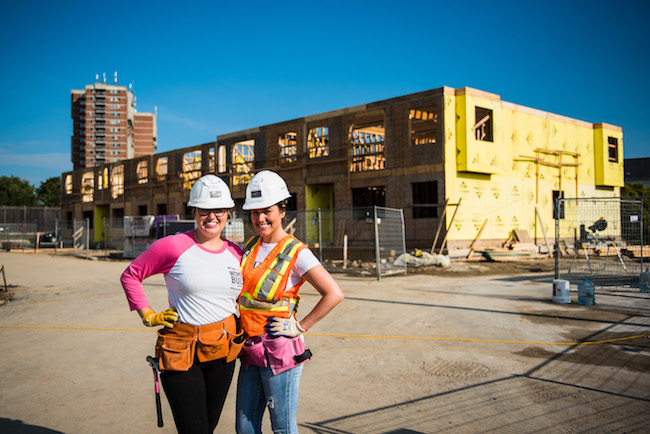
A woman’s perspective on life in the construction field
By Julie Zabizewski
Construction Labour Profiles Women in Construction
Julie Zabizewski alongside CAWIC President Luana Buratynski on a Habitat for Humanity Women Build project. PHOTO: Habitat for Humanity
As a little girl, I must admit, a career in construction was not the most obvious choice. I recall enjoying the arts; I had a passion for drawing and painting, though I was proficient in science and math. In high school, we had a class to help us determine career options, where you selected your gender, and it generated appropriate choices based on the subjects in which you accelerated. Accounting, human resources, interior design, and architecture were all selected for me, with the latter two being the most appealing as I appreciated design and how buildings tie into their environments.
I have always been very career oriented, but at the same time, I also saw myself one day becoming a mother. Like most others at this early crossroads in their lives, having children seemed like a distant prospect, as I knew my focus would be on achieving my career goals ahead of starting a family.
I ended up studying architecture, which was compelling, challenging and competitive. I was happy to see a good combination of men and women in my post-secondary program. We did a lot of group work as part of the curriculum and I consistently found myself in the role of team lead. One area we studied was project management, which I naturally gravitated towards. Although I had never considered this avenue, as I had never really known of any women in this type of role, colleagues encouraged me to explore it and, in the end, it was more in line with my personality and skillset.
I eventually secured a job with a construction management firm in a project coordinator position following graduation. I was unsure how my career would evolve, as it is a very male-dominated field and across the industry, those at the top of the corporate ladder were predominantly men. In this respect, support of upper management goes a long way. I feel strongly that the culture in each corporation sets the tone for career advancement. At Vestacon, the company I continue to work with today, I am fortunate to be among a group that values and respects each team member’s opinion and encourages career growth.
After a couple of years of pulling long hours as a coordinator and working hard to establish my value, I jumped at the chance to become an assistant project manager. Once I had the required project experience, I went for my Project Management Professional (PMP) designation. This led to my promotion into a project manager role. Leading my own construction jobs was incredibly rewarding and a huge leap forward in my career, however, I couldn’t help but notice moments when I was treated differently as a woman, than if I were a man in the same role. This is the hard truth but in time, as the industry evolves and more women take on power positions, I know there will be change.
To become engaged with more women in my field, I joined the Canadian Association of Women in Construction. Together, we work on many programming and educational events, raising funds to provide student bursary awards, and volunteering annually with Habitat for Humanity. One of my professors in university continuously emphasized the importance of networking, and in my experience, I could not agree more; not only as a keystone for developing your career but also as a support system. The women I volunteer with have come from different sectors of the industry and are of varying ages, but we all share common goals of establishing ourselves, achieving career advancement and encouraging women into the lucrative field of construction, as opportunities are abundant.
From my experience, it is important for women to lean in and get involved when opportunities present themselves. There is an unspoken pressure to stand out from our male counterparts. During the course of my career, I took on the additional assignment of establishing our company’s health and safety program and culture. Most recently, this involvement became very beneficial when we worked to navigate the COVID-19 pandemic, and I spearheaded new health and safety protocols. These efforts led to a managerial role, which I am very proud to have achieved.
Now at 35-years-old, having got to a point where I am thrilled to be celebrating my work achievements, I cannot help but look back at my other, more personal dream I had at the end of high school. Starting a family has never been more on my mind.
It should be noted that the average age for pregnancy in Canada has been over 30 since 2010. I have always questioned how companies and our governments effectively support high achieving women who have focused their 20s on their careers and are starting families in their 30s. Having had these discussions with my industry colleagues, it is hard to look at the current system as anything but outdated.
Employment Insurance (EI) in Canada covers 55 per cent of your earnings, to a maximum of $595 a week. This may benefit a woman in an entry level position, but certainly is a hard hit for a woman more advanced in her career making higher wages and possibly being the lead breadwinner for her home — especially when living in areas with a high cost of living. This also assumes the woman has a partner to help offset costs, although many are trying to have children on their own.
We live to a standard based on our income, so why would this change when we decide to start a family? To avoid penalizing women who find career success in their 20s, the benefits should reflect a percentage of earnings, not be capped at a weekly rate. As it is, to accept the loss of income, on top of the pressure to maintain career status and juggle motherhood, is incredibly discouraging.
At the same time, in other industries, employer top-ups to EI for women on maternity leave are well established. Unfortunately, the same cannot yet be said for construction, which until recently, has not typically promoted women into leadership roles. My hope is that as more women join the ranks in positions with higher levels of authority, the more these gaps will close. I believe the construction industry is moving in the right direction and I will continue to do my part to help accelerate this progress through leading by example and by continuing to encourage young women to explore their potential in this rewarding field. I would like to see governments and companies do the same by ensuring women have the proper support to start a family while also growing their careers.

Julie Zabizewski is a project manager and health & safety manager at Toronto, Ont-based Vestacon Ltd. She has managed numerous projects across Ontario and recently helped the firm adapt to the COVID-19 pandemic. She held an executive role on the board for the Canadian Association of Women in Construction (CAWIC) and also volunteers for Habitat for Humanity Women Build and the Toronto Construction Association.




